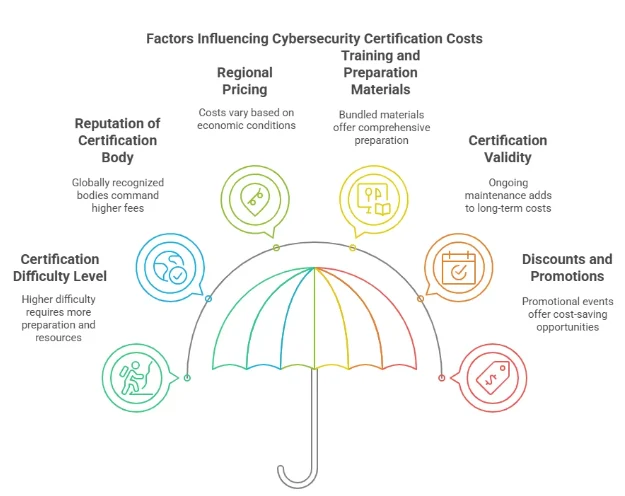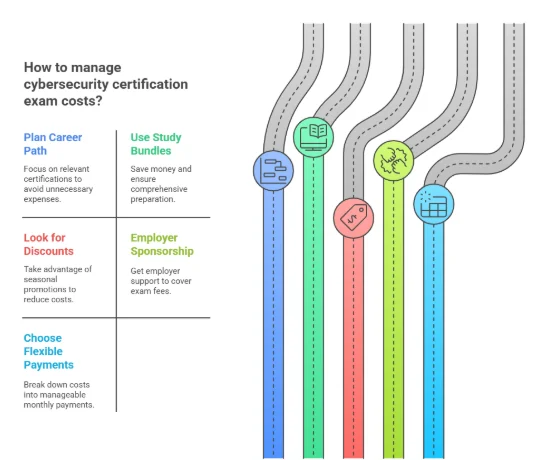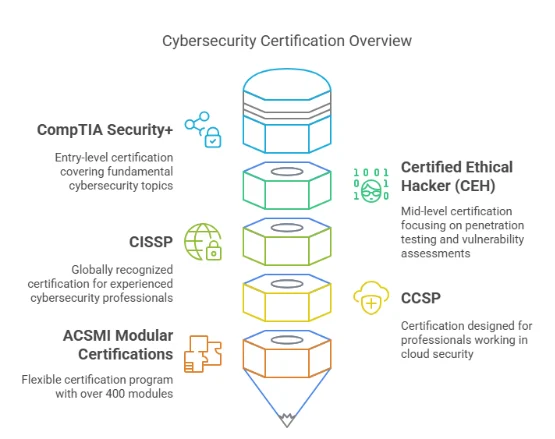Table of Contents
- Understanding the Cybersecurity Certification Exam Cost
- Factors Influencing Cybersecurity Certification Exam Cost
- Tips for Managing Cybersecurity Certification Exam Cost
- Popular Cybersecurity Certifications and Their Exam Costs
- FAQs About Cybersecurity Certification Exam Cost
- Certification Costs
- Final Thoughts
Advancing your career in cybersecurity often requires earning certifications that validate your skills and expertise. These credentials play a vital role in your professional development, making you more competitive in the job market and enabling you to take on higher-level roles. However, one of the most significant challenges professionals face when entering or progressing in the cybersecurity field is the cybersecurity certification exam cost. The cost of certification can vary greatly depending on the certification level and the provider. Therefore, understanding these costs—and how they relate to Security Technology Key Trends—will help you plan your career path more effectively.
This guide breaks down the costs of cybersecurity certification exams, identifying key influencing factors, offering tips on managing costs, and providing information about some popular certifications. We’ll also introduce platforms like ACSMI that offer flexible learning options, helping you pursue your certifications without financial strain.
Understanding the Cybersecurity Certification Exam Cost
The cybersecurity certification exam cost refers to the fee paid to sit for an exam that qualifies you for a specific cybersecurity certification. Certification bodies like CompTIA, (ISC)², and EC-Council set these fees based on the level of certification, complexity of the exam, and the associated value of the certification in the job market.
The costs of exams can vary from $200 for entry-level certifications to $1,200 or more for advanced, industry-recognized credentials like CISSP. Understanding the financial commitment involved in earning these certifications is essential for budgeting and planning your career trajectory effectively.
Key Price Ranges for Cybersecurity Certification Exams:
- Entry-Level Certifications: $200–$400
- Mid-Level Certifications: $400–$800
- Advanced Certifications: $800–$1,200+
By understanding these cost categories, you can better plan your spending and prioritize certifications that align with your career goals.
Factors Influencing Cybersecurity Certification Exam Costs
Various factors contribute to the wide variation in the costs of cybersecurity certification exams. These factors should be taken into account when you are budgeting for certification exams. Here’s a closer look at each one:

1. Certification Difficulty Level
The difficulty level of the certification exam has a direct impact on its cost. Generally, entry-level certifications are more affordable because they test fundamental knowledge, while advanced certifications require deeper expertise, experience, and higher-level strategic thinking. For example, exams like CompTIA Security+ are priced relatively lower, while CISSP and CEH exams are priced higher due to the in-depth, specialized knowledge required to pass.
More complex certifications require thorough preparation and often necessitate the use of additional study materials or more extensive courses, driving up the overall cost.
2. Reputation of the Certification Body
The credibility and global recognition of the certifying organization also affect the cost. Certifications from globally recognized bodies such as (ISC)² and EC-Council tend to have higher fees due to the reputation and value they carry in the job market. These certifications are often seen as industry standards, which is why they carry a premium price tag. Organizations and hiring managers recognize the rigor involved in earning these credentials, which makes them highly desirable for cybersecurity professionals.
3. Regional Pricing
Geographical location can influence the cost of cybersecurity certification exams. Some certification providers offer regional pricing based on the economic conditions in specific countries or regions. For example, providers may offer discounts for exams in developing countries to make certifications more accessible. This regional pricing structure ensures that professionals in different areas of the world can still afford certifications without financial barriers.
Additionally, exam fees may be affected by local taxes or administrative fees, which can add to the total cost of taking the exam in certain regions.
4. Training and Preparation Materials
Many certification programs bundle the exam fee with preparatory materials, such as study guides, practice tests, and access to online labs. While these bundled packages often result in higher up-front costs, they can provide significant value by offering comprehensive preparation. Some platforms, such as ACSMI, offer modular learning programs that cover all aspects of certification prep, helping to streamline your study process. These resources can save you money in the long run by reducing the need to purchase additional materials separately.
5. Certification Validity
Some certifications are valid for a set period and require ongoing Continuing Professional Education (CPE) credits to maintain the credential. Top Information Technology Security Certifications, like CISSP, require professionals to earn CPE credits over time to remain valid, which can lead to additional costs. Renewal fees and CPE course fees are typically lower than the initial exam fees, but they add to the long-term costs associated with maintaining your certification. On the other hand, certifications that are non-renewable may have a higher initial cost but do not require ongoing maintenance.
6. Discounts and Promotions
It’s always a good idea to look for discounts, especially during promotional events like Cybersecurity Awareness Month or Black Friday. ACSMI and other certification providers frequently offer discounts, bundle deals, or special pricing during certain times of the year. Being proactive and keeping an eye out for these opportunities can help you save significant amounts on your certification costs.
Tips for Managing Cybersecurity Certification Exam Costs
Managing the costs associated with cybersecurity certifications doesn’t have to be a financial burden. By following these smart strategies, you can pursue your certification goals without breaking the bank:

1. Plan Your Career Path
The first step in managing certification costs is to plan your career path. Consider which certifications align with your career goals and focus on those. If you’re just starting out in cybersecurity, it may be wise to focus on entry-level certifications like CompTIA Security+ before jumping into more specialized, advanced certifications. By identifying the certifications you need to advance in your field, you can avoid spending money on irrelevant credentials that won’t contribute to your career advancement.
2. Use Study Bundles
Many certification bodies offer study bundles that package together the exam fee with preparatory materials. These bundles typically include study guides, practice exams, and access to online labs, providing a more comprehensive learning experience for candidates. By investing in these bundles, you not only save money on purchasing materials separately but also ensure that you are well-prepared for the exam.
Platforms like ACSMI also offer modular learning options, where you can purchase individual modules for specific topics at a fraction of the cost of an entire certification program. These options give you flexibility while helping you stay on budget.
3. Look for Discounts and Special Promotions
Many providers, including (ISC)² and CompTIA, offer discounts during special times of the year, such as Cybersecurity Awareness Month or Black Friday. These promotions often include significant discounts on exam fees, bundled training, or other resources. Make sure to keep an eye out for these seasonal sales and take advantage of them to reduce costs.
4. Employer Sponsorship
Check with your employer to see if they offer sponsorship for certification exams. Many companies encourage employees to gain new skills and certifications, offering to cover the costs of the exam. Employer-sponsored certifications are a great way to offset the financial burden of certification exams. If your employer offers this benefit, make sure to inquire about the specifics of the reimbursement process.
5. Choose Flexible Payment Options
If the cost of certification exams is a significant financial concern, consider looking for platforms that offer flexible payment options. Providers like ACSMI often offer installment plans or financing options, allowing you to pay for your certification exams over time. This makes it easier to afford high-cost certifications by breaking the expense into manageable monthly payments.
Popular Cybersecurity Certifications and Their Exam Costs
When considering certification exams, it’s essential to understand the variety of certifications available and the costs associated with them. In today’s evolving landscape, Artificial Intelligence in Security Technology is also becoming a significant area of focus. Here are some of the most popular certifications, along with their associated fees:

1. CompTIA Security+
CompTIA Security+ is one of the most well-known entry-level cybersecurity certifications. It covers fundamental cybersecurity topics such as network security, risk management, and threat assessments. The exam fee is approximately $360, making it an affordable starting point for those new to the field of IT security.
2. Certified Ethical Hacker (CEH)
Certified Ethical Hacker (CEH) is a mid-level certification that focuses on penetration testing and vulnerability assessments. The exam fee for CEH is approximately $620, making it a significant investment for those pursuing a career in ethical hacking. The certification provides a deep dive into how hackers think and work, equipping professionals to protect against security threats.
3. Certified Information Systems Security Professional (CISSP)
CISSP is a globally recognized certification for experienced cybersecurity professionals. It covers areas such as security architecture, risk management, and cryptography. The exam fee for CISSP ranges from $749 to $999, depending on your location. CISSP is ideal for professionals looking to move into leadership roles or advanced technical positions in cybersecurity.
4. Certified Cloud Security Professional (CCSP)
CCSP is a certification designed for professionals working in cloud security. The certification focuses on data protection, identity management, and compliance in cloud environments. The exam fee for CCSP is approximately $599. This certification is especially valuable for cloud security engineers or professionals managing cloud environments.
5. ACSMI Modular Certifications
ACSMI offers a modular certification program that allows learners to select individual modules based on their career goals. Each module costs $180, and with over 400 modules available, this platform offers a flexible learning path. Bundle packages and promotions often reduce the cost, making ACSMI an affordable option for professionals seeking specialized certifications.
Final Thoughts
Understanding the costs associated with cybersecurity certification exams is essential for planning your career path effectively. From entry-level certifications like CompTIA Security+ to more advanced credentials like CISSP, each certification is an investment in your future. By utilizing flexible learning platforms like ACSMI and taking advantage of discounts or employer sponsorships, you can manage these costs without sacrificing your career goals.
By planning ahead, researching available resources, and choosing the right certifications for your career ambitions, you can successfully navigate the costs of cybersecurity certification exams and advance your career in this rapidly growing field.
FAQs About Cybersecurity Certification Exam Costs
1. Can beginners afford cybersecurity certification exams?
Yes, many beginner-level certifications, such as CompTIA Security+, are designed to be affordable. Additionally, platforms like ACSMI offer flexible pricing, making it easier for beginners to enter the field without financial stress.
2. Are discounts available for certification exams?
Yes, many certification providers offer temporary discounts during special events, such as Cybersecurity Awareness Month or Black Friday. These discounts can help you save on exam fees, study materials, and other certification-related costs.
3. Why are advanced certification exams more expensive?
Advanced certifications require in-depth knowledge and often assess specialized skills. The higher fees reflect the prestige of the certification and the rigorous preparation required to pass.
4. Do certification prices include training materials?
Some providers, like ACSMI, include training materials with the exam fees, while others charge separately for study guides, practice exams, or labs. Be sure to check whether the exam cost includes these resources before purchasing.
5. Can I retake the exam without repaying the full fee?
It depends on the certification provider. Some organizations offer discounted retake fees, while others require you to pay the full cost for retaking the exam.

Leave a Reply